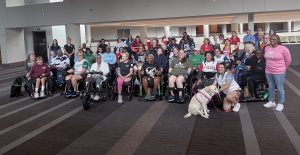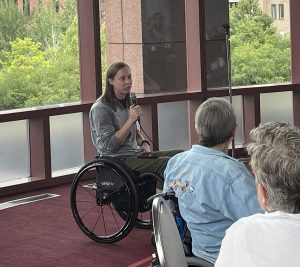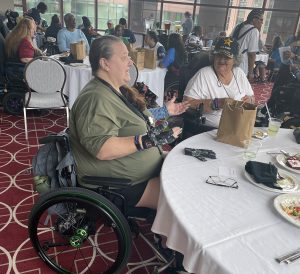NVWG women athletes take time for camaraderie
Competition is a major part of the National Veterans Wheelchair Games (NVWG), taking place this week in Minneapolis. But camaraderie and forging friendships, particularly among women veterans, is also a big reason many athletes participate in the Games.
That’s why more than 40 women veteran athletes took part in a meetup Thursday in the Minneapolis Convention Center in Minnesota as part of the NVWG, co-sponsored by Paralyzed Veterans of America (PVA) and the Department of Veterans Affairs (VA).

PVA National Vice President Anne Robinson spoke briefly about PVA’s advocacy initiatives for women veterans and encouraged the new athletes to get involved with the PVA Anita Bloom Women Veterans Committee.
“Get phone numbers from people you can text throughout the year, and when you get back here next year, it’ll be just like best friends reunited,” Robinson says.
Jennifer Massey, who works in the PVA Research and Education Department, says the number of women attending the NVWG has grown each year, and this year, more than 80 women are competing.
“That is a testament to me, you know, you are showing up and you are being in these spaces and encouraging others in your chapters or in your areas to do the same,” Massey says. “So, again, just know that you all truly inspire me as a woman to do this job every day. Because like I said, for me, representation matters. So, just know that you all have a space. And I am glad to see that you all right here are taking the forefront.”
U.S. Paralympic and national team wheelchair rugby player Sarah Adam also addressed the group, taking a moment to reflect on the power of adaptive sports and the women’s responsibility to open the door for others who are just getting started.

Adam says she grew up in a wildly competitive family, and sports were always part of her core identity. However, while in graduate school at Washington University in St. Louis in 2016, she was diagnosed with multiple sclerosis (MS). She says people began treating her like she was fragile, and she no longer recognized herself as a strong, independent woman. Rather than accept the stereotype, she decided to rebel against it and decided to play wheelchair rugby.
“I remember showing up to Team USA tryouts, and I had no idea how my body was going to handle the physical demands of rugby or how I was going to juggle being a full-time professor and training and competing and traveling, or even how my mostly male teammates were going to handle me as one of the only female players.,” Adam says. “But what I did know was that this was going to be an opportunity for me to defy expectations and not be limited by my circumstances.”
She’s now on her fourth year on Team USA and her first as a co-captain. She was also the first female to compete for Team USA in wheelchair rugby at the 2024 Paralympic Games in Paris and brought home a silver medal.
Adam says she sometimes reflects on how her life would have been had she not found adaptive sports.
“I would still have MS, but I’m certain that I would not have been reconnected with my identity as an athlete and my confidence in my person, in my identity as a person with a disability,” she says. “You know, I think this incredible community of people who challenge me and support me and help me grow have been crucial to me being out here on this stage today.”
She says women athletes have the power and responsibility to push others to be the best version of themselves.
“Even if you’re scared and you’re nervous and you don’t know how it’s going to go, put yourself out there and be that person that makes sure that no one’s left behind,” Adam says. “No one’s left questioning whether or not they belong in this space, in the world of adaptive sports. Because it doesn’t just build strength for us, it helps us reconnect with who we are. It reminds us that we’re still competitors. We’re still leaders. We’re still bold, capable women. And sometimes, all it takes to unlock that confidence is another woman who sees it in us first. So, please continue, as you all have, to step up, speak out, stay engaged. Not just for yourself, but for that next woman that’s behind you.”
Novice athlete and PVA Michigan Chapter member Monica Munir says Adam’s speech inspired her to think about how she can get into the Paralympics in some sport.

“I don’t care what it is. It could even be playing chess or checkers,” Munir says.
The 50-year-old Hazel Park, Mich., resident served in the Army Reserves from 1994 to 1997, active duty from 1997 to 1998 and Army National Guard from 2001 to 2002. She sustained a level L2-L4 incomplete spinal cord injury in Germany in 1997 following five surgeries to repair three herniated discs, and it has since progressed to level T6.
She says she wanted to attend the women athletes meetup to meet people who understand what she’s going through.
“So we can talk and get different ideas of how to cope with different things,” Munir says. “No offense to men, but they’re not like us. They can do different things. They have a different mentality. They don’t have the same type of feeling or way of thinking. So, it’s just like like-minded people getting together, uplifting and encouraging each other.”
